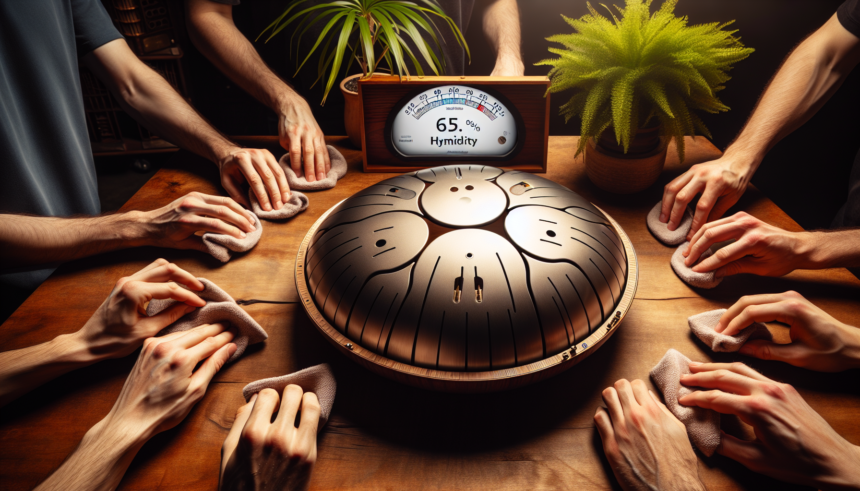The handpan, also known as the hang drum, is a unique and relatively new musical instrument that requires careful maintenance. One of the crucial aspects of taking care of your handpan is maintaining the ideal humidity level. Humidity affects the instrument’s tuning, lifespan, and overall sound quality. In this article, we will delve into understanding the importance of humidity for your handpan, how to maintain the optimal levels, and tips for ensuring your instrument remains in perfect condition.
Why Humidity Matters for Your Handpan
Handpans are generally made from nitrided steel or stainless steel. Both materials are susceptible to humidity-induced issues like rust and corrosion. Over time, exposure to high or low humidity levels can compromise the instrument’s structural integrity, leading to problems such as detuning, material degradation, and surface damage. Therefore, maintaining a stable and appropriate humidity level is essential for keeping your handpan in excellent playing condition.
The Ideal Humidity Range
The ideal relative humidity (RH) for storing and playing a handpan ranges between 40-50%. This range helps to prevent rust, corrosion, and detuning. Humidity levels outside this range can cause problems; lower humidity can lead to metal contraction and increased brittleness, while higher humidity can cause metal expansion and the formation of rust.
How to Monitor Humidity Levels
To ensure your handpan stays in the ideal humidity range, consider the following steps:
- Hygrometer: A hygrometer is an essential tool for monitoring the humidity levels in the environment where your handpan is stored. Digital hygrometers offer accurate readings and are easy to use.
- Humidity-Controlled Case: Using a humidity-controlled case can help regulate the RH level around your handpan. These cases often come with built-in hygrometers and humidifiers/desiccants to maintain the desired humidity range.
Maintaining Optimal Humidity Levels
Once you have a hygrometer, it’s time to take measures to maintain the optimal humidity levels. Here are a few methods to consider:
Using a Dehumidifier
A dehumidifier can be very effective if you live in an area with high humidity. Place the dehumidifier in the room where you store your handpan to keep the humidity levels in check. Make sure to monitor the RH levels regularly to avoid over-drying the air, which could also harm your handpan.
Using a Humidifier
Conversely, if you live in a dry area, a humidifier can help to increase humidity levels to the ideal range. Choose a humidifier with a built-in hygrometer for automatic adjustment, ensuring that the humidity levels do not exceed the recommended range.
Silica Gel Packs
Silica gel packs can be used to control humidity within a case. These packs absorb excess moisture and help to maintain a stable environment. However, they need to be replaced periodically for continued effectiveness.
Humidipak
Humidipak solutions, such as those used in guitar cases, are designed to control and maintain humidity within a specific range. Humidipaks are useful for handpans as they can provide a consistent humidity level without the need for continuous monitoring and adjustment.
Storing Your Handpan
Proper storage is crucial for maintaining the humidity levels around your handpan. Here are some tips for optimal storage:
- Avoid Direct Sunlight: Exposure to direct sunlight can cause temperature fluctuations, which can affect humidity levels and potentially damage the handpan.
- Avoid Damp Places: Storing your handpan in a damp environment can lead to rust and corrosion. Always choose a dry location for storage.
- Use a Case: A hard or soft case can provide a stable microenvironment for your handpan, especially if it is humidity-controlled.
- Room Environment: Maintain a consistent room environment. Avoid placing the handpan near vents, radiators, or air conditioners that could cause sudden changes in humidity and temperature.
Maintenance Tips
In addition to controlling humidity, regular maintenance can help to extend the life of your handpan:
- Cleaning: Clean the surface of your handpan regularly using a soft, dry cloth. Avoid using harsh chemicals or abrasive materials that could damage the finish.
- Oiling: Applying a thin layer of natural oil (like coconut oil) can help protect the surface from rust. Be sure to use a non-corrosive, natural oil and apply it sparingly.
- Regular Inspections: Inspect your handpan frequently for any signs of rust, corrosion, or mechanical damage. Early detection can prevent more severe problems down the line.
Conclusion
Maintaining the perfect humidity level for your handpan is essential for preserving its sound quality, structural integrity, and lifespan. By using tools like hygrometers, dehumidifiers, and humidifiers, and by following proper storage and maintenance practices, you can ensure that your handpan remains in excellent condition for years to come. Whether you are a casual player or a dedicated musician, taking these steps will help you enjoy the beautiful and unique sound of your handpan for as long as possible.
Frequently Asked Questions (FAQs)
1. Can I store my handpan in a regular instrument case?
While a regular instrument case can offer some protection, it may not provide adequate humidity control. Investing in a humidity-controlled case is recommended to maintain the optimal RH levels around your handpan.
2. How often should I oil my handpan?
Oiling your handpan once every few months is generally sufficient. However, if you live in a particularly dry or humid environment, you might need to adjust the frequency. Always use a natural, non-corrosive oil and apply it sparingly.
3. What should I do if I notice rust on my handpan?
If you notice rust, it’s essential to address it immediately. Gently clean the affected area with a non-abrasive cloth and apply a natural oil to protect the metal. If the rust is extensive, consult a professional for repair.
4. Can playing my handpan outside affect its humidity levels?
Playing your handpan outdoors can expose it to fluctuating humidity levels, which can impact its condition. If you often play outside, consider using a portable humidity-controlled case for storage and transport.
5. Is it necessary to use a hygrometer?
Using a hygrometer is highly recommended for accurately monitoring the humidity levels around your handpan. It provides real-time data, allowing you to make informed decisions to maintain the ideal RH range.





